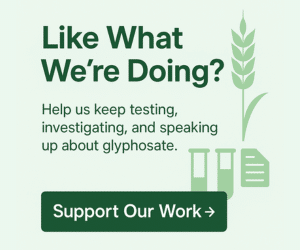The Legal Storm Bayer Can’t Shake
Bayer’s acquisition of Monsanto in 2018 marked the beginning of an ongoing legal nightmare. Since purchasing the agrochemical giant, Bayer has been bombarded with thousands of lawsuits alleging that Monsanto’s flagship herbicide, Roundup, causes cancer. The legal fallout has been costly, both financially and reputationally.
But why did Bayer take on such a controversial legacy? Did they underestimate the public outcry, or did they think they could simply outspend the problem? These questions remain unanswered as the legal challenges continue to mount.
The Core Issue: Glyphosate and Cancer
At the heart of these lawsuits lies glyphosate, the active ingredient in Roundup. Plaintiffs, many of whom are former agricultural workers or frequent users of the herbicide, claim that exposure to glyphosate caused them to develop non-Hodgkin lymphoma.
What’s unsettling is how divided the science is. In 2015, the International Agency for Research on Cancer (IARC) classified glyphosate as “probably carcinogenic to humans.” Meanwhile, the U.S. Environmental Protection Agency (EPA) continues to claim that glyphosate is safe when used as directed.
Are we looking at a case of selective science — where only favorable studies make it to the policy table? Or is this a genuine scientific debate? Either way, consumers are left navigating a maze of conflicting information.
Massive Payouts and Mounting Pressure
Bayer has been ordered to pay billions in damages through a series of landmark cases. In one high-profile lawsuit, a California jury awarded over $2 billion to a couple claiming Roundup caused their cancer, though the award was later reduced on appeal. Even after adjustments, the financial burden remains immense.
Does Bayer see these payouts as the cost of doing business? Or is there a strategy behind settling some cases while aggressively fighting others? One thing is clear: the company is trying to contain the damage, but new cases keep emerging.
Bayer’s Attempt at Damage Control
To limit future liabilities, Bayer attempted to implement a plan to manage ongoing litigation through a proposed $2 billion settlement, which would have capped future claims. A judge rejected the proposal, citing concerns that it unfairly limited the rights of individuals who might develop cancer in the future.
Why would Bayer propose a plan that prioritizes their financial safety over potential future victims? The optics are questionable, and the court wasn’t buying it. Bayer’s subsequent decision to reformulate Roundup for the U.S. consumer market — removing glyphosate from residential products but keeping it for agricultural use — seems like a half-hearted concession.
Why keep selling glyphosate-based products to the agricultural sector? Is the profit margin simply too big to abandon? Or does Bayer genuinely believe that agricultural use poses less risk to consumers? Either way, this selective phase-out raises questions about Bayer’s long-term strategy and commitment to safety.
Public Reaction and Consumer Trust
The Roundup litigation and its associated health risks have undeniably impacted consumer perceptions. Despite Bayer’s assurances that glyphosate is safe, many people are now actively seeking alternatives. The ongoing legal battles and rising public awareness are prompting some consumers to rethink their use of glyphosate-based products.
In the court of public opinion, Bayer’s reputation has taken a hit. With consumers increasingly questioning the safety of products that were once considered harmless, the company is left managing not only legal fallout but also a crisis of trust.
What This Means for Consumers
The legal battle surrounding Roundup has sparked a broader conversation about corporate accountability and public health. Bayer continues to assert that glyphosate is safe, but the courtroom battles suggest that juries aren’t convinced.
Should we take Bayer’s assurances at face value? Or is this just another example of corporate spin when the evidence points in a different direction? As consumers, it’s crucial to question who benefits when “safe levels” keep creeping upward while the real-world impacts go ignored.
Final Thoughts
Bayer’s ongoing legal struggles serve as a reminder that corporate decisions often prioritize profit over public safety. The Roundup saga is far from over, and with each new lawsuit, the stakes grow higher. We can’t afford to ignore these warning signs — it’s time to question everything and assume nothing when it comes to the products marketed as safe. As consumers, our vigilance is essential in holding corporations accountable for the lasting impact of their actions.
If you’re concerned about glyphosate’s impact on public health and the environment, explore more articles and resources here. Let’s hold corporations accountable and advocate for safer food and farming practices.
When profit is prioritized over public safety, it’s not the company that pays the price — it’s all of us.
Further Reading:
If you’d like to dive deeper into the ongoing legal battles, safety debates, and public health concerns surrounding glyphosate and Roundup, the following resources offer a range of perspectives and analyses.
IARC Monograph on Glyphosate – International Agency for Research on Cancer (IARC)
Details the classification of glyphosate as “probably carcinogenic to humans.”
Link: IARC Monograph on Glyphosate
EPA Finalizes Glyphosate Mitigation
This page discusses the conclusion of the EPA’s regulatory review of glyphosate, highlighting their stance and the next steps. Since the article questions Bayer’s corporate strategy and the safety assessments of glyphosate, this link provides an official position that contrasts with the IARC classification.
Link: EPA Finalizes Glyphosate Mitigation
Bayer ordered to pay $2.25 billion in latest Roundup trial – Reuters
Details a Pennsylvania jury’s decision ordering Bayer to pay $2.25 billion to a man who developed cancer after using Roundup.
Link: Bayer ordered to pay $2.25 billion in latest Roundup trial
Popular weedkiller Roundup on trial again as cancer victims demand justice – The Guardian
Explores major lawsuit outcomes and why Bayer continues to face legal challenges.
Link: The Guardian Roundup Lawsuits
Going, going, gone? EWG finds glyphosate levels drop in oat-based products
Discover how recent testing shows a decline in glyphosate levels in oat-based foods. The EWG highlights progress but urges caution as glyphosate remains present in many products.
Link: EWG Article, Going, going, gone?
CDC finds toxic weedkiller in 87 percent of children tested
A concerning CDC study reveals that glyphosate was detected in 87% of children tested. The EWG responds with a call for stricter regulations and greater consumer awareness.
Link: EWG Article
These resources provide valuable insights and up-to-date information on the complex issues surrounding glyphosate. Staying informed is key to understanding both the science and the ongoing legal implications.
Image Source & Attribution
We’re grateful to the talented photographers and designers whose work enhances our content. The feature image on this page is by armmypicca. You can find more of their work on 123rf.com.




